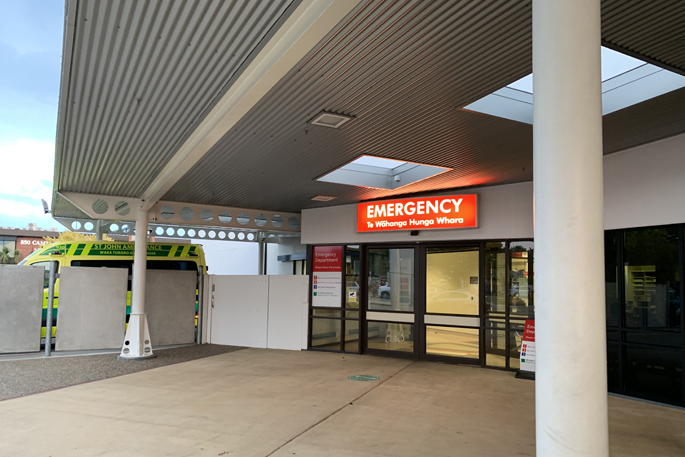Emergency doctors are calling for appropriately trained security staff to be posted 24-hours a day in every emergency department, and for other measures to protect and restore the nation’s struggling EDs and staff – and get more patients the healthcare they need.
The doctors, from the Australasian College for Emergency Medicine - ACEM, have determined solutions for the issues in the health system that lead to long, dangerous waits for care, staff burnout and rising levels of aggression and violence in EDs.
“Te Whatu Ora has security staff located within their large, urban emergency departments, stationed overnight at a minimum,” says Te Whatu Ora chief people officer Andrew Slater.
This includes Tauranga and Whakatane Hospitals.
“Outside of these periods, they are supported by on-site security who are able to respond immediately to any incidents outside.”
To help protect and restore New Zealand’s struggling emergency departments and staff, ACEM is calling for political parties contesting the 2023 election to commit to:
- The delivery and appropriate staffing of all mental health facilities pledged in the 2019 mental health budget package, ensuring more acute mental health care beds are available for patients across New Zealand.
- The urgent delivery of 150 appropriately staffed high-level aged care residential beds.
- The implementation of identified solutions that provide and retain the emergency care workforce needed to deliver safe care and protect the wellbeing of staff.
- The implementation of a plan to collect accurate ethnicity data, audit health care outcomes for equity and address identified inequities in the ED.
- 24/7 security staff posted at every ED, integrated, and appropriately trained to best support staff, patients, whānau and visitors.
ACEM is the peak body for emergency medicine in Australia and New Zealand, responsible for training emergency physicians and advancement of professional standards.
The organisation says it will publicly support pre-electoral pledges that align with these five solutions and invites political parties to work with New Zealand’s emergency doctors on implementing the fixes across the nation.
“Emergency departments and staff have always been there 24/7 for all people who need acute care,” says ACEM Aotearoa New Zealand Chair, Dr Kate Allan.
“But they are under unprecedented pressure and need Aotearoa’s help to keep providing vital care.
“This election, political parties must commit to fixes that protect and restore New Zealand’s struggling emergency departments and staff – and get more people the timely healthcare they need.”
Dr Allan says violence in emergency departments is increasing.
“All people must be safe to receive, deliver and support care in emergency departments, and violence or aggression cannot be accepted. 24/7 security staff posted at every ED, integrated and appropriately trained to best support staff, patients, whānau and visitors, can free up medical staff to focus on delivering crucial care.”
Andrew says on-site security will respond in some of the smaller emergency departments.
“In others, overnight security can be stood up in emergency departments on busy nights,” says Andrew.
“We are currently reviewing our security requirements, particularly in relation to our emergency departments.
“Our aim is to provide staff, patients and visitors with specialist healthcare security resource to keep people safe from violence and aggression, including 24/7 where required.”
Andrew says there has been an increase in reported incidents of violence and aggression in EDs in the last 12 months.
“There are several reasons for this including the fact that we have better reporting systems and staff are encouraged to report all incidents of verbal or physical aggression.
“While not every reported instance will meet the threshold to be considered unsafe, early reporting helps us address pressures before they become more serious. These reports also help us build a more reliable picture over time of where we are seeing more reports of threats or violence towards staff – which means we can respond accordingly as one system.
“Nationally, we’ve identified that workplace violence is a critical risk and there are a number of actions underway to respond to violence and aggression in the workplace.”
Andrew says they have identified that the design of the ED facilities can help create safe work environments.
“This can be including safe and secure spaces for staff or security measures like restricted swipe card access areas and security alarms.”
Dr Allan says insufficient resources in the broader health system are causing delays in the ED.
“More staffed beds are urgently required across the system, particularly in acute mental health and aged care, and it is vital that we implement plans to retain and recruit an appropriate, skilled healthcare workforce,” says Dr Allan.
“Long waits for care are dangerous, for everyone. New Zealand can’t wait any more.”



1 comment
The Master
Posted on 13-09-2023 15:28 | By Ian Stevenson
Apparently the huge pay increase of nurses wages has resulted in a large reduction in funding for doctors to help fiddle the books to try to fudge it to the election I guess. So how does that fix anything? Maybe time for a clean out of the "over-burden"... all the overpaid, masses of managers and other wombles existing/residing all over the place.
Result, less doctors, less GP's, more waiting times in A&E etc.
Brilliant planning here to!
Leave a Comment
You must be logged in to make a comment.